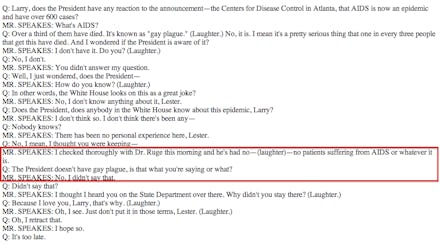In 1982, the White House Press Corps Thought AIDS Was a Joke

The news: On Monday, President Obama announced a new initiative to find a cure for HIV infections funded by $100 million in redirected spending. Funding will derive from AIDS research grants ending over the next three years.
"The United States should be at the forefront of new discoveries into how to put people into long-term remission without requiring lifelong therapies — or better yet, eliminate it completely," said the president. The announcement comes on the heels of growing optimism that a cure for HIV can be found.
Additionally, the president offered $5 billion in funding for the next three years to the Global Fund to Fight AIDS, TB, and Malaria if other countries matched double that amount — an amount that would set the fund well ahead of its goal to top the $9.3 billion raised three years ago.
Why's this so important? Today, you probably don't need to be told why fighting HIV/AIDS is so important — it's a global epidemic that has killed millions of people.
But 30 years ago, the Reagan administration's press secretary, Larry M. Speakes, and press corps thought it was hilarious. Here's the first time HIV/AIDS was brought to the White House's attention during a press briefing:
Transcript:
It wasn't the only time, either. Here's an excerpt of a press briefing from June 13, 1983:
Q: Larry, does the President think that it might help if he suggested that the gays cut down on their "cruising"? (Laughter.) What? I didn’t hear your answer, Larry.
MR. SPEAKES: I just was acknowledging your interest —
Q: You were acknowledging but —
MR. SPEAKES: — interest in this subject.
Q: — you don’t think that it would help if the gays cut down on their cruising — it would help AIDS?
MR. SPEAKES: We are researching it. If we come up with any research that sheds some light on whether gays should cruise or not cruise, we’ll make it available to you. (Laughter.)
Q: Back to fairy tales.
The Reagan administration's indifference to HIV, motivated primarily by the fact that it mostly affected gay Americans, had deadly consequences. By 1984, HIV/AIDs had spread to an estimated 300,000 people in the U.S. And yet, here is how Reagan's White House was still responding on Dec. 11, 1984:
MR. SPEAKES: Lester’s beginning to circle now. He’s moving in front. (Laughter.) Go ahead.
Q: Since the Center for Disease Control in Atlanta — (laughter) — reports —
MR. SPEAKES: This is going to be an AIDS question.
Q: — that an estimated —
MR. SPEAKES: You were close.
Q: Well, look, could I ask the question, Larry?
MR. SPEAKES: You were close.
Q: An estimated 300,000 people have been exposed to AIDS, which can be transmitted through saliva. Will the President, as Commander-in-Chief, take steps to protect Armed Forces food and medical services from AIDS patients or those who run the risk of spreading AIDS in the same manner that they forbid typhoid fever people from being involved in the health or food services?
MR. SPEAKES: I don’t know.
Q: Could you — Is the President concerned about this subject, Larry —
MR. SPEAKES: I haven’t heard him express —
Q: — that seems to have evoked so much jocular —
MR. SPEAKES: — concern.
Q: — reaction here? I — you know —
Q: It isn’t only the jocks, Lester.
Q: Has he sworn off water faucets —
Q: No, but, I mean, is he going to do anything, Larry?
MR. SPEAKES: Lester, I have not heard him express anything on it. Sorry.
Q: You mean he has no — expressed no opinion about this epidemic?
MR. SPEAKES: No, but I must confess I haven’t asked him about it. (Laughter.)
Q: Would you ask him Larry?
MR. SPEAKES: Have you been checked? (Laughter.)
The result of Reagan's silence on AIDS?
Image credit: Centers For Disease Control
In 1985, Rep. Henry Waxman (D-Los Angeles) wrote in the Washington Post that "It is surprising that the president could remain silent as 6,000 Americans died, that he could fail to acknowledge the epidemic's existence. Perhaps his staff felt he had to, since many of his New Right supporters have raised money by campaigning against homosexuals."
The estimated cumulative number of persons across the United States who have died of a diagnosed HIV/AIDS infection through 2010 is 636,048.